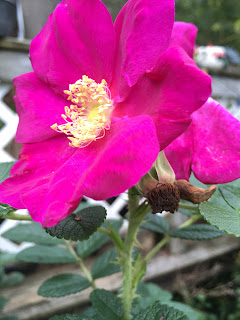Power of the Plants, right on.
I am taking a few course currently to continue to expand my knowledge of people, plants, and the inter-relationships that abound. All part of my ongoing journey as an herbalist. In the course focused on permaculture and sustainable gardening, one of the assignments included a discussion prompt, my response to which follows:
Plants have a variety of excellent characteristics they have developed through adaptation that suit them to survival in relation to their environment. These characteristics are, lucky for we humans, also amazing active constiuents that support human wellness. The 16 categories in which the specific phytochemicals fall are:
First, some common 'weeds', or so the uninformed refer to these glories:
Plantago major (plain old plantain, not the banana relative) - the leaves are demulcent and vulnerary - effective to put on insect wound (bite / sting) to releive itching and pain
Taraxacum officinalis (a dandy dandelion) - bitter, chologogue - both root and leaf, diuretic, again both root and leaf
Articum sp. (bold, bodacious burdock) - contains inulin, a prebiotic
Achillea millefolium - vulnerary, antimicrobial - excellent topical application to stop bleeding, also digestive support and nervine
Viola sororia (lovely little viola) - demulcent, flowers rich in bioflavenoids
Glechoma hederacea (good ol' ground ivy) - gets the glymph moving (lymph of brain)
Chenopodium album (luscious lambs quarter) - super duper nutrient (vitamin and mineral) dense
Then a few other dears, less 'weedy' a reputation
Valeriana officianlis (vunderful valerian, okay I could not think of an apt v adjective) - famous nervine qualities
Rosa rugosa (rose, by any other name would smell as sweet, quoth shakespeare) - a host of qualities, including emotional and nervous system support (rose petals, use organic!) and heaps of vitamin C (rosehips)
Lavendula angustifolium (long lived lavendar) - so many good thing - nervine, soothing ans supportive of restful sleep, for sure
Salix spp. (Willow, the wise willow) - analgesic, think aspirin, for it had its inspiration from acetylsalicylic acid, which is in willow, among other plants.
Urtica dioica (nourishing nettles) - diuretic, astringent, super nutrient (minerals and vitammins)
did I mention I love talking about plants with constituents that generously support humans? Well, I do!
Plants have a variety of excellent characteristics they have developed through adaptation that suit them to survival in relation to their environment. These characteristics are, lucky for we humans, also amazing active constiuents that support human wellness. The 16 categories in which the specific phytochemicals fall are:
- Anthocyanins
- Alkaloids
- Anthraquinones
- Bitters
- Cardian Glycosides
- Courmarins
- Cyanogenic glycosides
- Flavanoids
- Glucosilinates
- Mineral
- Vitamins
- Volatile Oils
- Tannins
- Saponins
- Phenols
- Mucilege
First, some common 'weeds', or so the uninformed refer to these glories:
Plantago major (plain old plantain, not the banana relative) - the leaves are demulcent and vulnerary - effective to put on insect wound (bite / sting) to releive itching and pain
Taraxacum officinalis (a dandy dandelion) - bitter, chologogue - both root and leaf, diuretic, again both root and leaf
Articum sp. (bold, bodacious burdock) - contains inulin, a prebiotic
Achillea millefolium - vulnerary, antimicrobial - excellent topical application to stop bleeding, also digestive support and nervine
Viola sororia (lovely little viola) - demulcent, flowers rich in bioflavenoids
Glechoma hederacea (good ol' ground ivy) - gets the glymph moving (lymph of brain)
Chenopodium album (luscious lambs quarter) - super duper nutrient (vitamin and mineral) dense
Then a few other dears, less 'weedy' a reputation
Valeriana officianlis (vunderful valerian, okay I could not think of an apt v adjective) - famous nervine qualities
Rosa rugosa (rose, by any other name would smell as sweet, quoth shakespeare) - a host of qualities, including emotional and nervous system support (rose petals, use organic!) and heaps of vitamin C (rosehips)
Lavendula angustifolium (long lived lavendar) - so many good thing - nervine, soothing ans supportive of restful sleep, for sure
Salix spp. (Willow, the wise willow) - analgesic, think aspirin, for it had its inspiration from acetylsalicylic acid, which is in willow, among other plants.
Urtica dioica (nourishing nettles) - diuretic, astringent, super nutrient (minerals and vitammins)
did I mention I love talking about plants with constituents that generously support humans? Well, I do!


Comments
Post a Comment